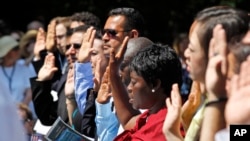Donald Trump, the leading 2016 U.S. Republican presidential contender, has ignited new consideration of an old idea: ending the country's nearly 150-year-old grant of citizenship to anyone born in the United States.
The billionaire real estate mogul, who has soared to the top of surveys of Republican voters with calls to deport the country's 11 million illegal immigrants, says birthright citizenship "remains the biggest magnet for illegal immigration."
He says he wants to amend the U.S. Constitution to repeal the 14th Amendment clause that declares "all persons born or naturalized in the United States" are U.S. citizens.
The Mexican government attacked Trump's anti-immigration proposals Wednesday, saying they "reflect prejudice, racism or plain ignorance.”
"Anyone who understands the depth of the U.S.-Mexico relationship realizes that those proposals are not only prejudiced and absurd, but would be detrimental to the well-being of both societies," the Mexico’s Foreign Ministry said.
Five months ahead of the first state-by-state contests to pick a Republican presidential nominee, Trump and his 16 rivals for the party’s nomination are all calling for tough measures to curb the flow of undocumented immigrants across the southern U.S. border with Mexico. But not all of them support Trump's call for ending birthright citizenship, including two of his key rivals, former Florida governor Jeb Bush, the son and brother of two U.S. presidents, and Florida Senator Marco Rubio.
Bush called birthright citizenship "a constitutionally protected right." Rubio said, "I'm open to doing things that prevent people from coming to the U.S. to take advantage of the 14th Amendment, but I'm not in favor of repealing it." Other Republican contenders say they support Trump's stance.
‘Birth tourists’
The Center for Immigration Studies, which seeks to limit immigration to the United States, says that 30 of the world's 194 countries allow birthright citizenship, but that the United States and Canada are the only two advanced economies that do so. The group contends that foreign women entering the U.S. as "birth tourists" are annually giving birth to 36,000 babies so their children can become American citizens.
An independent 2010 study by the Pew Hispanic Center estimated that 340,000 out of 4.3 million babies born in the U.S. in 2008 were the children of immigrants who had entered the country illegally, about eight percent of the total.
Birthright citizenship in the U.S. dates to its founding days in the 18th century, when English common law was imported to the first American colonies.
The issue of citizenship came to the forefront with an infamous 1857 U.S. Supreme Court ruling that birthright citizenship did not apply to the children of slaves. But after the country's Civil War in the 1860s, when anti-slavery northern states defeated a southern confederacy favoring slavery, the country's Constitution was amended to make it clear that all freed slaves were U.S. citizens.
At the end of the 19th century, the Supreme Court further upheld that interpretation, ruling all children born in the U.S., except for those of diplomats serving in the country, invading armies and those born on foreign public ships, are U.S. citizens.
Conservative lawmakers in the U.S. have occasionally attempted to revoke the birthright citizenship provision, but have failed to win broad support for doing so.
Amending the U.S. Constitution is difficult, requiring both chambers of Congress to approve any changes with a two-thirds vote, followed by approval from at least 38 of the 50 state legislatures.
Watch related video by VOA's Deborah Block:






